- Home
- Louisa May Alcott
A Classic Christmas Page 15
A Classic Christmas Read online
Page 15
Away from the tender Shepherd’s care.
“‘Lord, Thou hast here Thy ninety and nine;
Are they not enough for Thee?’
But the Shepherd made answer: ‘Tis of mine
Has wandered away from me;
And although the road be rough and steep
I go to the desert to find my sheep.’”
John heard with an absorbed interest. All around him were eager listeners, breathless, leaning forward with intense attention. The song went on:
“But none of the ransomed ever knew
How deep were the waters crossed;
Nor how dark was the night that
the Lord went through
Ere He found His sheep that was lost.
Out in the desert He heard its cry—
Sick and helpless, and ready to die.”
There was a throbbing pathos in the intonation, and the verse floated over the weeping throng; when, after a pause, the strain was taken up triumphantly:
“But all through the mountains thunder-riven,
And up from the rocky steep,
There rose a cry to the gates of heaven,
‘Rejoice! I have found my sheep!’
And the angels echoed around the throne,
‘Rejoice, for the Lord brings back His own!’”
All day long, poor John had felt so lonesome! Nobody cared for him; nobody wanted him; everything was against him; and, worst of all, he had no faith in himself. But here was this Friend, seeking him, following him through the cold alleys and crowded streets. In heaven they would be glad to hear that he had become a good man. The thought broke down all his pride, all his bitterness; he wept like a little child; and the Christmas gift of Christ—the sense of a real, present, loving, pitying Saviour—came into his very soul.
He went homeward as one in a dream. He passed the drinking-saloon without a thought or wish of drinking. The expulsive force of a new emotion had for the time driven out all temptation. Raised above weakness, he thought only of this Jesus, this Saviour from sin, who he now believed had followed him and found him, and he longed to go home and tell his wife what great things the Lord had done for him.
Scene V
Meanwhile a little drama had been acting in John’s humble home. His wife had been to the shop that day and come home with the pittance for her work in her hands.
“I’ll pay you full price to-day, but we can’t pay such prices any longer,” the man had said over the counter as he paid her. “Hard times—work dull—we are cutting down all our work-folks; you’ll have to take a third less next time.”
“I’ll do my best,” she said meekly, as she took her bundle of work and turned wearily away, but the invisible arm of the Shining One was round her, and the words again thrilled through her that she had read that morning: “He shall redeem their soul from deceit and violence, and precious shall their blood be in his sight.” She saw no earthly helper; she heard none and felt none, and yet her soul was sustained, and she came home in peace.
When she opened the door of her little room she drew back astonished at the sight that presented itself. A brisk fire was roaring in the stove, and the tea-kettle was sputtering and sending out clouds of steam. A table with a white cloth on it was drawn out before the fire, and a new tea set of pure white cups and saucers, with teapot, sugar-bowl, and creamer, complete, gave a festive air to the whole. There were bread, and butter, and ham-sandwiches, and a Christmas cake all frosted, with little blue and red and green candles round it ready to be lighted, and a bunch of hot-house flowers in a pretty little vase in the centre.
A new stuffed rocking-chair stood on one side of the stove, and there sat Miss Florence De Witt, our young princess of Scene First, holding little Elsie in her lap, while the broad, honest countenance of Betty was beaming with kindness down on the delighted face of Tottie. Both children were dressed from head to foot in complete new suits of clothes, and Elsie was holding with tender devotion a fine doll, while Tottie rejoiced in a horse and cart which he was maneuvering under Betty’s superintendence.
The little princess had pleased herself in getting up all this tableau. Doing good was a novelty to her, and she plunged into it with the zest of a new amusement. The amazed look of the poor woman, her dazed expressions of rapture and incredulous joy, the shrieks and cries of confused delight with which the little ones met their mother, delighted her more than any scene she had ever witnessed at the opera—with this added grace, unknown to her, that at this scene the invisible Shining Ones were pleased witnesses.
She had been out with Betty, buying here and there whatever was wanted—and what was not wanted for those who had been living so long without work or money?
She had their little coal-bin filled, and a nice pile of wood and kindlings put behind the stove. She had bought a nice rocking-chair for the mother to rest in. She had dressed the children from head to foot at a ready-made clothing store, and bought them toys to their hearts’ desire, while Betty had set the table for a Christmas feast.
And now she said to the poor woman at last:
“I’m so sorry John lost his place at father’s. He was so kind and obliging, and I always liked him; and I’ve been thinking, if you’d get him to sign the pledge over again from Christmas Eve, never to touch another drop, I’ll get papa to take him back. I always do get papa to do what I want, and the fact is, he hasn’t got anybody that suited him so well since John left. So you tell John that I mean to go surety for him; he certainly won’t fail me. Tell him I trust him.” And Miss Florence pulled out a paper wherein, in her best round hand, she had written out again the temperance pledge, and dated it “Christmas Eve, 1875.”
“Now, you come with John to-morrow morning, and bring this with his name to it, and you’ll see what I’ll do!” and, with a kiss to the children, the little good fairy departed, leaving the family to their Christmas Eve.
What that Christmas Eve was, when the husband and father came home with the new and softened heart that had been given him, who can say? There were joyful tears and solemn prayers, and earnest vows and purposes of a new life heard by the Shining Ones in the room that night.
“And the angels echoed around the throne,
Rejoice! for the Lord brings back his own.”
Scene VI
“Now, papa, I want you to give me something special to-day, because it’s Christmas,” said the little princess to her father, as she kissed and wished him “Merry Christmas” next morning.
“What is it, Pussy—half of my kingdom?”
“No, no, papa; not so much as that. It’s a little bit of my own way that I want.”
“Of course; well, what is it?”
“Well, I want you to take John back again.”
Her father’s face grew hard.
“Now, please, papa, don’t say a word till you have heard me. John was a capital gardener; he kept the green-house looking beautiful; and this Mike that we’ve got now, he’s nothing but an apprentice, and stupid as an owl at that! He’ll never do in the world.”
“All that is very true,” said Mr. De Witt, “but John drinks, and I won’t have a drinking man.”
“But, papa, I mean to take care of that. I’ve written out the temperance pledge, and dated it, and got John to sign it, and here it is,” and she handed the paper to her father, who read it carefully, and sat turning it in his hands while his daughter went on:
“You ought to have seen how poor, how very poor they were. His wife is such a nice, quiet, hardworking woman, and has two such pretty children. I went to see them and carry them Christmas things yesterday, but it’s no good doing anything if John can’t get work. She told me how the poor fellow had been walking the streets in the cold, day after day, trying everywhere, and nobody would take him. It’s a dreadful time now for a man to be out of work, and it isn’t fair his poor wife and children should suffer. Do try him again, papa!”
“John always did better with the pineapples than anybody we h
ave tried,” said Mrs. De Witt at this point. “He is the only one who really understands pineapples.”
At this moment the door opened, and there was a sound of chirping voices in the hall. “Please, Miss Florence,” said Betty, “the little folks says they wants to give you a Christmas.” She added in a whisper: “They thinks much of giving you something, poor little things—plaze take it of ’em.” And little Tottie at the word marched in and offered the young princess his dear, beautiful, beloved string of glass beads, and Elsie presented the cross of red berries—most dear to her heart and fair to her eyes. “We wanted to give you something,” she said bashfully.
“Oh, you lovely dears!” cried Florence; “how sweet of you! I shall keep these beautiful glass beads always, and put the cross up over my dressing-table. I thank you ever so much!”
“Are those John’s children?” asked Mr. De Witt, winking a tear out of his eye—he was at bottom a soft-hearted old gentleman.
“Yes, papa,” said Florence, caressing Elsie’s curly hair, “see how sweet they are!”
“Well—you may tell John I’ll try him again.” And so passed Florence’s Christmas, with a new, warm sense of joy in her heart, a feeling of something in the world to be done, worth doing.
“How much joy one can give with a little money!” she said to herself as she counted over what she had spent on her Christmas. Ah yes! and how true that “It is more blessed to give than to receive.” A shining, invisible hand was laid on her head in blessing as she lay down that night, and a sweet sense of a loving presence stole like music into her soul. Unknown to herself, she had that day taken the first step out of self-life into that life of love and care for others which brought the King of Glory down to share earth’s toils and sorrows. And that precious experience was Christ’s Christmas gift to her.
POEMS
CLEMENT CLARKE MOORE
1779–1863
A VISIT FROM ST. NICHOLAS
(or, ’Twas the Night Before Christmas)
’Twas the night before Christmas, when all through
the house
Not a creature was stirring, not even a mouse;
The stockings were hung by the chimney
with care,
In hopes that St. Nicholas soon would be there;
The children were nestled all snug in their beds,
While visions of sugar-plums danced in their heads;
And mamma in her ’kerchief, and I in my cap,
Had just settled our brains for a long winter’s nap,
When out on the lawn there arose such a clatter,
I sprang from the bed to see what was the matter.
Away to the window I flew like a flash,
Tore open the shutters and threw up the sash.
The moon on the breast of the new-fallen snow
Gave the lustre of mid-day to objects below,
When, what to my wondering eyes should appear,
But a miniature sleigh, and eight tiny reindeer,
With a little old driver, so lively and quick,
I knew in a moment it must be St. Nick.
More rapid than eagles his coursers they came,
And he whistled, and shouted, and called them
by name;
“Now, Dasher! now, Dancer! now, Prancer and
Vixen!
On, Comet! on, Cupid! on, Donner and Blitzen!
To the top of the porch! to the top of the wall!
Now dash away! dash away! dash away all!”
As dry leaves that before the wild hurricane fly,
When they meet with an obstacle, mount to the sky;
So up to the house-top the coursers they flew,
With the sleigh full of Toys, and St. Nicholas too.
And then, in a twinkling, I heard on the roof
The prancing and pawing of each little hoof.
As I drew in my head, and was turning around,
Down the chimney St. Nicholas came with a
bound.
He was dressed all in fur, from his head to his foot,
And his clothes were all tarnished with ashes
and soot;
A bundle of Toys he had flung on his back,
And he looked like a peddler just opening
his pack.
His eyes—how they twinkled! his dimples how
merry!
His cheeks were like roses, his nose like a cherry!
His droll little mouth was drawn up like a bow
And the beard of his chin was as white as the snow;
The stump of a pipe he held tight in his teeth,
And the smoke it encircled his head like a wreath;
He had a broad face and a little round belly,
That shook when he laughed, like a bowlful of jelly.
He was chubby and plump, a right jolly old elf,
And I laughed when I saw him, in spite of myself;
A wink of his eye and a twist of his head,
Soon gave me to know I had nothing to dread;
He spoke not a word, but went straight to his work,
And filled all the stockings; then turned with a jerk,
And laying his finger aside of his nose,
And giving a nod, up the chimney he rose;
He sprang to his sleigh, to his team gave a whistle,
And away they all flew like the down of a thistle,
But I heard him exclaim, ere he drove out of sight,
“Happy Christmas to all, and to all a good-night.”
ELIZABETH BARRETT BROWNING
1806–1861
THE HOLY NIGHT
We sate among the stalls at Bethlehem;
The dumb kine from their fodder turning them,
Softened their horn’d faces,
To almost human gazes
Toward the newly Born:
The simple shepherds from the star-lit brooks
Brought visionary looks,
As yet in their astonished hearing rung
The strange sweet angel-tongue:
The magi of the East, in sandals worn,
Knelt reverent, sweeping round,
With long pale beards, their gifts upon the ground,
The incense, myrrh, and gold
These baby hands were impotent to hold:
So let all earthlies and celestials wait
Upon thy royal state.
Sleep, sleep, my kingly One!
HENRY WADSWORTH LONGFELLOW
1807–1882
THE THREE KINGS
Three Kings came riding from far away,
Melchior and Gaspar and Baltasar;
Three Wise Men out of the East were they,
And they travelled by night and they slept by day,
For their guide was a beautiful, wonderful star.
The star was so beautiful, large and clear,
That all the other stars of the sky
Became a white mist in the atmosphere,
And by this they knew that the coming was near
Of the Prince foretold in the prophecy.
Three caskets they bore on their saddle-bows,
Three caskets of gold with golden keys;
Their robes were of crimson silk with rows
Of bells and pomegranates and furbelows,
Their turbans like blossoming almond-trees.
And so the Three Kings rode into the West,
Through the dusk of the night, over hill and dell,
And sometimes they nodded with beard on
breast,
And sometimes talked, as they paused to rest,
With the people they met at some wayside well.
“Of the child that is born,” said Baltasar,
“Good people, I pray you, tell us the news;
For we in the East have seen his star,
And have ridden fast, and have ridden far,
To find and worship the King of the Jews.”
And the people answered, “You ask in vain;
&nbs
p; We know of no King but Herod the Great!”
They thought the Wise Men were men insane,
As they spurred their horses across the plain,
Like riders in haste, who cannot wait.
And when they came to Jerusalem,
Herod the Great, who had heard this thing,
Sent for the Wise Men and questioned them;
And said, “Go down unto Bethlehem,
And bring me tidings of this new king.”
So they rode away; and the star stood still,
The only one in the grey of morn;
Yes, it stopped—it stood still of its own free will,
Right over Bethlehem on the hill,
The city of David, where Christ was born.
And the Three Kings rode through the gate and
the guard,
Through the silent street, till their horses turned
And neighed as they entered the great inn-yard;
But the windows were closed, and the doors were
barred,
And only a light in the stable burned.
And cradled there in the scented hay,
In the air made sweet by the breath of kine,
The little child in the manger lay,
The child, that would be king one day
Of a kingdom not human, but divine.
His mother Mary of Nazareth
Sat watching beside his place of rest,
Watching the even flow of his breath,
For the joy of life and the terror of death
Were mingled together in her breast.
They laid their offerings at his feet:
The gold was their tribute to a King,
The frankincense, with its odor sweet,
Was for the Priest, the Paraclete,
The myrrh for the body’s burying.
And the mother wondered and bowed her head,
And sat as still as a statue of stone,
Her heart was troubled yet comforted,
Remembering what the Angel had said
Of an endless reign and of David’s throne.
Then the Kings rode out of the city gate,
With a clatter of hoofs in proud array;
But they went not back to Herod the Great,

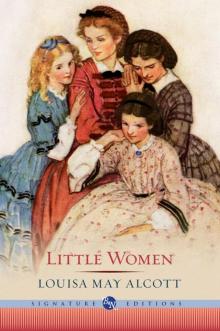 Little Women
Little Women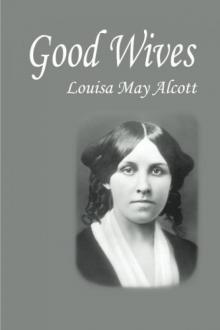 Good Wives
Good Wives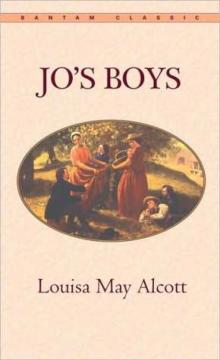 Jo's Boys
Jo's Boys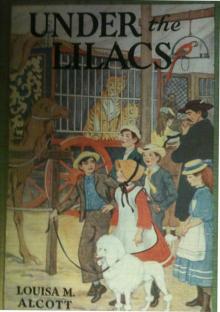 Under the Lilacs
Under the Lilacs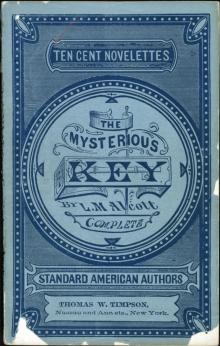 The Mysterious Key and What It Opened
The Mysterious Key and What It Opened The Inheritance
The Inheritance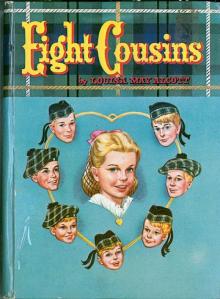 Eight Cousins
Eight Cousins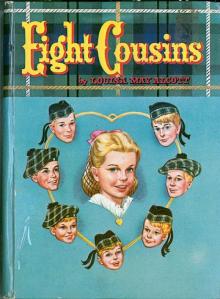 Eight Cousins; Or, The Aunt-Hill
Eight Cousins; Or, The Aunt-Hill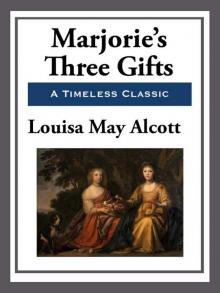 Marjorie's Three Gifts
Marjorie's Three Gifts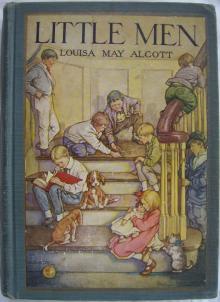 Little Men
Little Men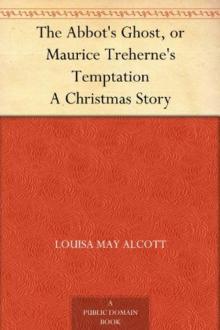 The Abbot's Ghost, or Maurice Treherne's Temptation: A Christmas Story
The Abbot's Ghost, or Maurice Treherne's Temptation: A Christmas Story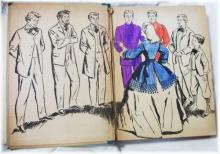 Rose in Bloom
Rose in Bloom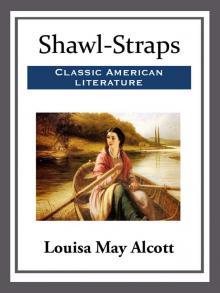 Shawl-Straps
Shawl-Straps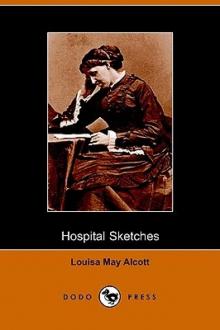 Hospital Sketches
Hospital Sketches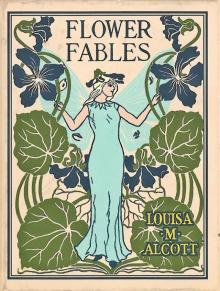 Flower Fables
Flower Fables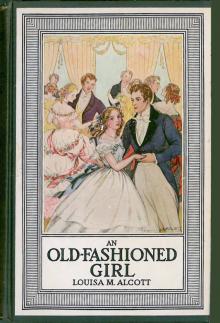 An Old-Fashioned Girl
An Old-Fashioned Girl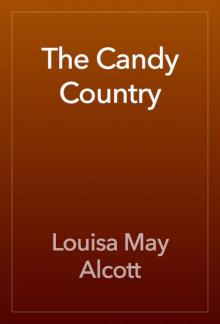 The Candy Country
The Candy Country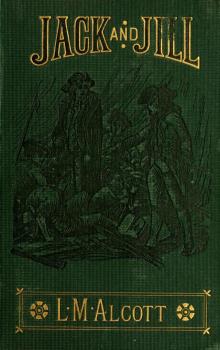 Jack and Jill
Jack and Jill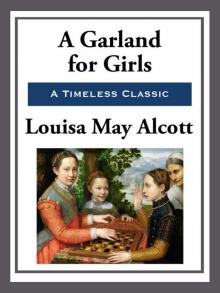 A Garland for Girls
A Garland for Girls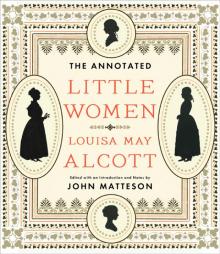 The Annotated Little Women
The Annotated Little Women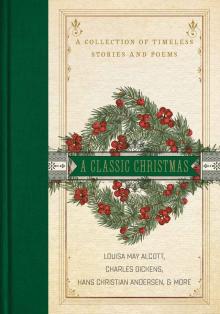 A Classic Christmas
A Classic Christmas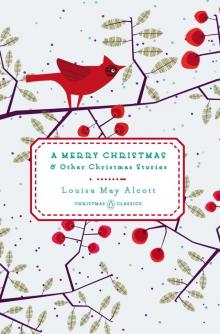 A Merry Christmas
A Merry Christmas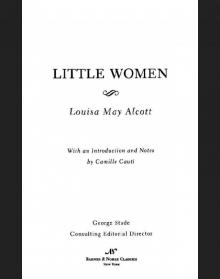 Little Women (Barnes & Noble Classics Series)
Little Women (Barnes & Noble Classics Series)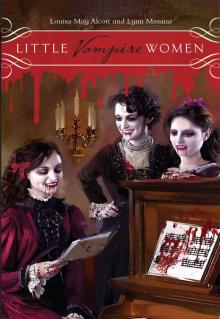 Little Vampire Women
Little Vampire Women